 The Seagate Enterprise Value HDD which is also known as the Constellation CS, is a 3.5", 7,200RPM SATA drive with a maximum capacity of 3TB that is targeted at organizations looking for the cost-effectiveness of consumer HDDs but also the enterprise features they need. The Constellation CS fit those needs by offering inexpensive bulk-storage for cases such as hosting unstructured data in the cloud with the lowest $/GB cost in the market. Adding to the Constellation CS drives’ overall value is that at 2.75W/TB, it also offers the lowest power consumption of any new enterprise-class HDD, drawing up to 29% less power than competitive high-capacity enterprise drives by Seagate’s numbers.
The Seagate Enterprise Value HDD which is also known as the Constellation CS, is a 3.5", 7,200RPM SATA drive with a maximum capacity of 3TB that is targeted at organizations looking for the cost-effectiveness of consumer HDDs but also the enterprise features they need. The Constellation CS fit those needs by offering inexpensive bulk-storage for cases such as hosting unstructured data in the cloud with the lowest $/GB cost in the market. Adding to the Constellation CS drives’ overall value is that at 2.75W/TB, it also offers the lowest power consumption of any new enterprise-class HDD, drawing up to 29% less power than competitive high-capacity enterprise drives by Seagate’s numbers.
The Seagate Enterprise Value HDD which is also known as the Constellation CS, is a 3.5", 7,200RPM SATA drive with a maximum capacity of 3TB that is targeted at organizations looking for the cost-effectiveness of consumer HDDs but also the enterprise features they need. The Constellation CS fit those needs by offering inexpensive bulk-storage for cases such as hosting unstructured data in the cloud with the lowest $/GB cost in the market. Adding to the Constellation CS drives’ overall value is that at 2.75W/TB, it also offers the lowest power consumption of any new enterprise-class HDD, drawing up to 29% less power than competitive high-capacity enterprise drives by Seagate’s numbers.
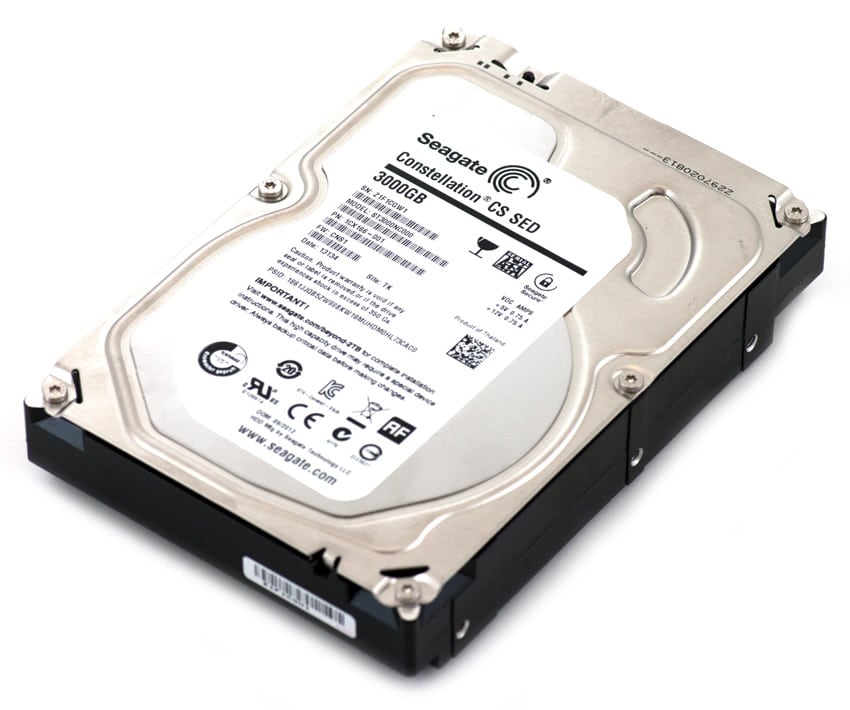
The enterprise hard drive market is seeing new segmentation thanks in large part to a developing class of data that’s deemed important enough for access that tape archival isn’t the right place for it, but the data is also low value enough that 15K, 10K and even SAS 7.2K hard drives are too expensive to deploy and operate. Many hyperscale organizations fall into this category as well as purpose built backup and archival appliances that often rely on consumer SATA hard drives for the reduced cost. Seagate aims to blend lower prices with enhanced enterprise features in the Constellation CS to give this emerging market a hard drive that’s tailored to meet these needs.
Seagate Constellation CS HDDs also offer security features that are valued with paramount importance by lots of enterprises. Organizations can select optional Self-Encrypting Drive (SED) models that feature Instant Secure Erase. The integrity of drive is thus unlikely to be compromised thanks to the encryption and the Instant Secure Erase feature that is able to render all data unintelligible in a matter of just seconds. This makes the process of retiring drives near the end of their life cycle much easier, especially when considering that most organizations may need to retire a whole load of drives at one time.
Seagate Constellation CS HDDs are available now. Our review model is the 3TB SED model.
Seagate Constellation CS Specifications
- Capacity
- Standard Models: ST3000NC002 (3TB), ST2000NC001 (2TB), ST1000NC001 (1TB)
- Instant Secure Erase Models: ST3000NC000 (3TB), ST2000NC000 (2TB), ST1000NC000 (1TB)
- Performance
- Interface: SATA 6Gb/s
- Spindle Speed (RPM): 7200
- DDR2 Cache, Multisegmented (MB): 64
- Burst Data Transfer Rate (MB/s): 600
- Seek Average, Read/Write (ms): 9.5/10.5
- Max Sustained Data Rate, OD Read (MB/s): 150 to 180
- Rotational Vibration Tolerance @ 20Hz to 1500Hz, w/RVFF (rad/s2): 12.5
- Linear Random Vibration @ 10Hz to 500Hz (Grms ref): 4.9
- Configuration
- Heads/Disks: 6/3 (3TB), 4/2 (2TB), 2/1 (1TB)
- Bytes per Sector (512-byte emulation): 4096
- Reliability/Data Integrity
- Load/Unload Cycles (25°C, 50% relative humidity): 300,000
- Nonrecoverable Read Errors per Bits Read, Max 1 per 10E14
- Mean Time Between Failures (MTBF): 800,000
- Power-On Hours 8760 (24×7)
- Power Management
- Operating Mode Power (typical, W): 8.0
- Idle Power (W): 5.53
- Standby/Sleep Mode (W): 0.77
- Voltage Tolerance (including noise): 5V ± 5%, 12V ± 10%
- Environmental
- Operating Temperature (°C): 5 to 60
- Nonoperating Temperature (°C): −40 to 70
- Relative Humidity, Operating/Nonoperating (%): 5 to 90/5 to 95
- Acoustics (typical/max, bels): 2.5/2.6 (3TB), 2.4/2.5 (2TB), 2.2/2.3 (1TB)
- Special Features
- Flagged Write Uncorrectable (Logical Block Management)
- PowerChoice On-Demand Power Savings
- SeaTools Diagnostic Software
- S.M.A.R.T. Drive Monitoring and Reporting
- Hotplug Operation (per SATA Rev. 3.0 Specifications)
- Enterprise CS Phone Support: Limited
- Dimensions for 3TB (HxWxD): 26.1mm (1.028") x 101.85mm (4.010") x 147.00mm (5.787")
- Weight: 626g/1.38lb (3TB)
- Warranty: 3 years limited
Design and Build
The Seagate Constellation CS hard drives have a similar appearance to standard consumer counterparts. The drives aren’t flashy; they are functional. The top of the drive is all silver with an inlay in the center adding protection to the drive head. Also featured on the top, there are six screws enabling access to the internal parts of the drive. The sides of the drive have six standard screw holes, three per side, for simple mounting within an drive tray.
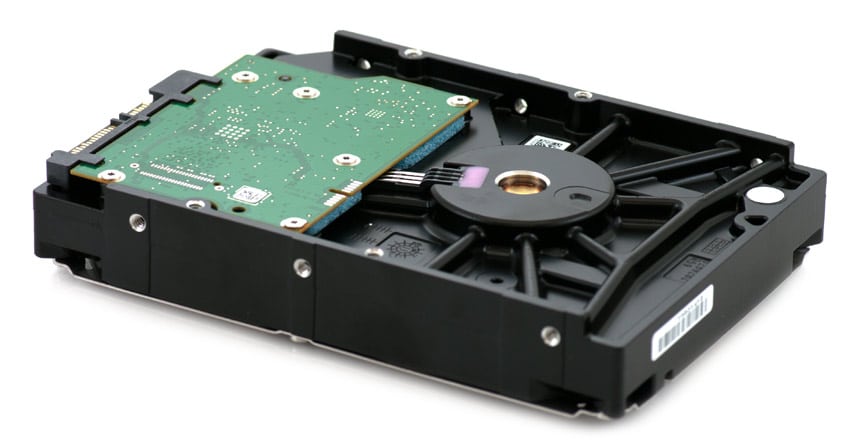
Flipping to the rear of the Constellation CS 3TB SED 3.5-inch hard drive, we can see that the HDD is based on a SATA 6Gb/s interface. The circuit board mounted to the bottom is fairly compact, with all components facing inward towards the HDD body to use the aluminum structure as a heatsink.
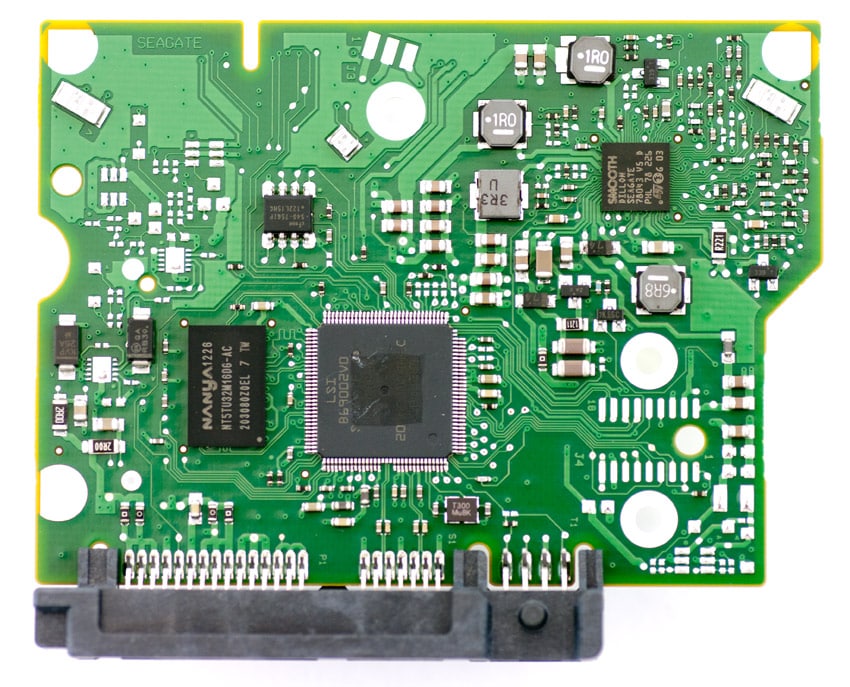
The circuit board includes an LSI B69002V0 controller, as well as 64MB of DRAM from the Nanya DDR2 module.
Testing Background and Comparables
Comparables for this review:
All enterprise HDDs are benchmarked on our enterprise testing platform based on a Lenovo ThinkServer RD240. The ThinkServer RD240 is configured with:
- 2 x Intel Xeon X5650 (2.66GHz, 12MB Cache)
- Windows Server 2008 Standard Edition R2 SP1 64-Bit and CentOS 6.2 64-Bit
- Intel 5500+ ICH10R Chipset
- Memory – 8GB (2 x 4GB) 1333Mhz DDR3 Registered RDIMMs
- LSI 9211 SAS/SATA 6.0Gb/s HBA
Enterprise Synthetic Workload Analysis
Our enterprise hard drive benchmark process preconditions each drive into steady-state with the same workload the device will be tested with under a heavy load of 16 threads with an outstanding queue of 16 per thread, and then tested in set intervals in multiple thread/queue depth profiles to show performance under light and heavy usage. Since hard drives reach their rated performance level very quickly, we only graph out the main sections of each test.
Preconditioning and Primary Steady-State Tests:
- Throughput (Read+Write IOPS Aggregate)
- Average Latency (Read+Write Latency Averaged Together)
- Max Latency (Peak Read or Write Latency)
- Latency Standard Deviation (Read+Write Standard Deviation Averaged Together)
Our Enterprise Synthetic Workload Analysis includes four profiles based on real-world tasks. These profiles have been developed to make it easier to compare to our past benchmarks as well as widely-published values such as max 4k read and write speed and 8k 70/30, which is commonly used for enterprise drives. We also included two legacy mixed workloads, the traditional File Server and Webserver, each offering a wide mix of transfer sizes.
- 4k
- 100% Read or 100% Write
- 100% 4k
- 8k 70/30
- 70% Read, 30% Write
- 100% 8k
- 128k (Sequential)
- 100% Read or 100% Write
- 100% 128k
- File Server
- 80% Read, 20% Write
- 10% 512b, 5% 1k, 5% 2k, 60% 4k, 2% 8k, 4% 16k, 4% 32k, 10% 64k
- Webserver
- 100% Read
- 22% 512b, 15% 1k, 8% 2k, 23% 4k, 15% 8k, 2% 16k, 6% 32k, 7% 64k, 1% 128k, 1% 512k
In the first of our enterprise workloads, we measured a long sample of random 4k performance with 100% write and 100% read activity to get our main results. The Seagate Constellation CS 3TB SED measured 115 IOPS read and 154 IOPS write, which beat out the WD Black 4TB, but couldn’t match the other drives.
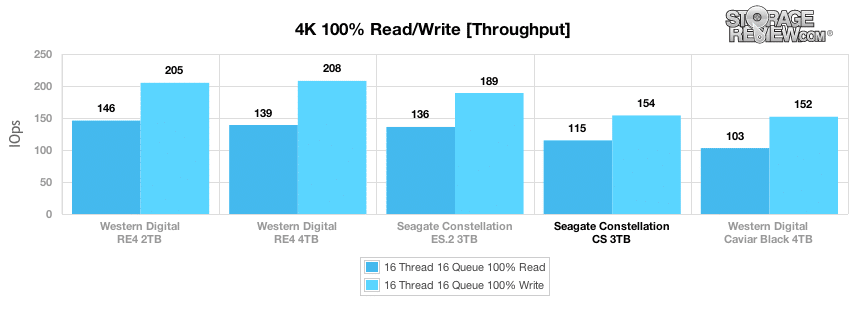
In our main average latency segment with a load of 16T/16Q, we measured an average read latency of 2216.37ms and a write latency of 1651.14ms from the Seagate Constellation CS, which again bested just the WD Black 4TB.
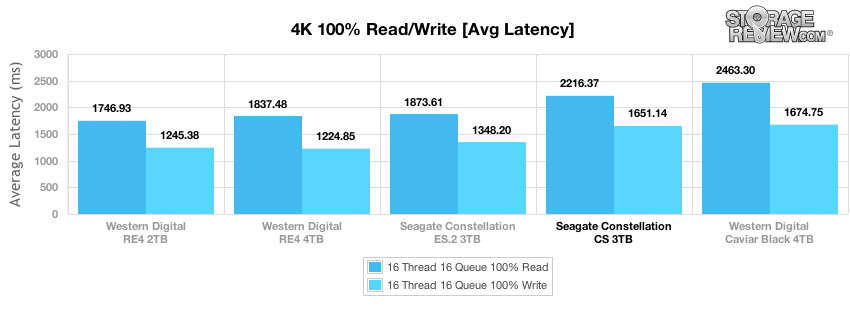
Measuring just read activity, the Seagate Constellation CS had a max response time of 6052.0ms while the write activity max latency was 4486.0ms. Those results placed the Constellation CS at the bottom of the pack.
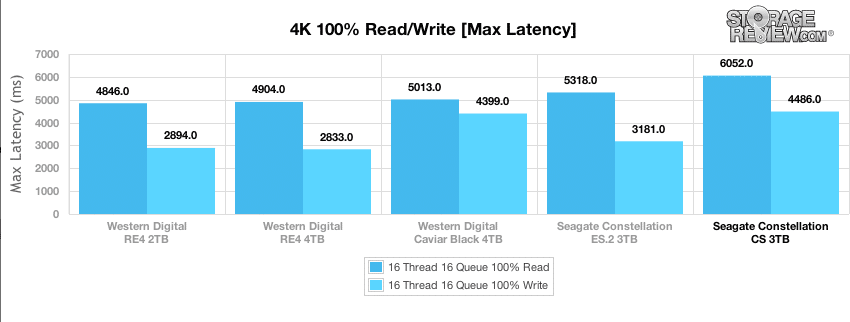
Reviewing the 4K latency consistency in our standard deviation section, the Seagate Constellation CS tested at 560.60ms read standard deviation. It came in at 436.15ms write standard deviation. The Constellation CS 3TB was able to edge out the WD Black 4TB in read activity deviation, but the Black 4TB was better in write activity.
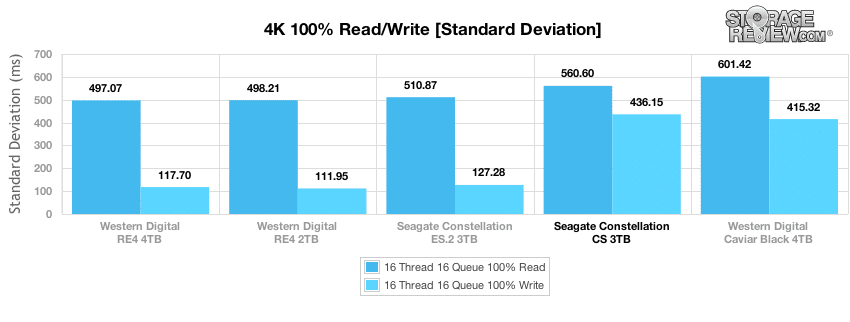
Compared to the fixed 16 thread, 16 queue max workload we performed in the 100% 4k write test, our mixed workload profiles scale the performance across a wide range of thread/queue combinations. In these tests, we span workload intensity from 2 threads and 2 queue up to 16 threads and 16 queue. In the expanded 8k 70/30 test, the Seagate Constellation CS 3TB came in ahead of the WD Black 4TB with greater IOPS throughout, and aside from the earliest queue depths, it was second from the bottom.
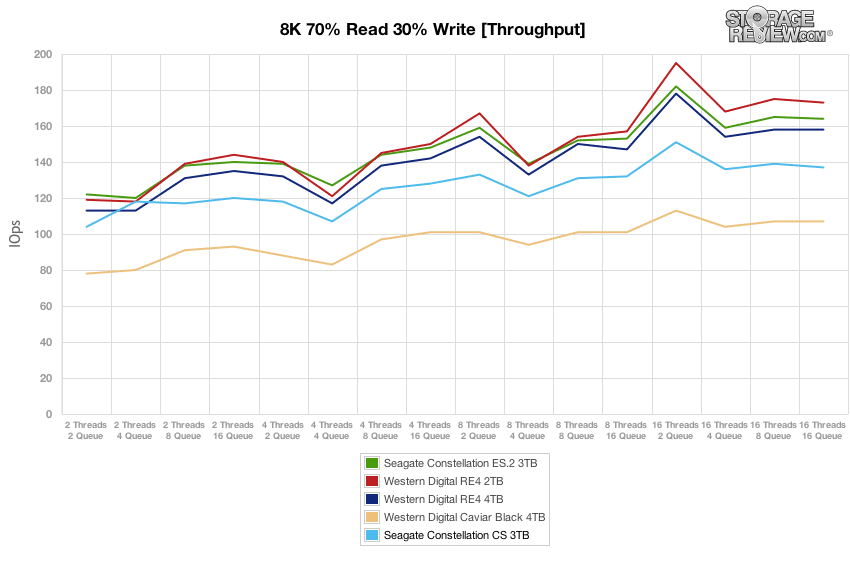
Looking over the 8k 70/30 average response times, the Seagate Constellation CS hung fairly tight with the other drives, aside from the WD Black 4TB which had consistently more latency. For the first half of the testing, the Constellation CS behind by a narrow margin which widened but stayed close as testing continued.
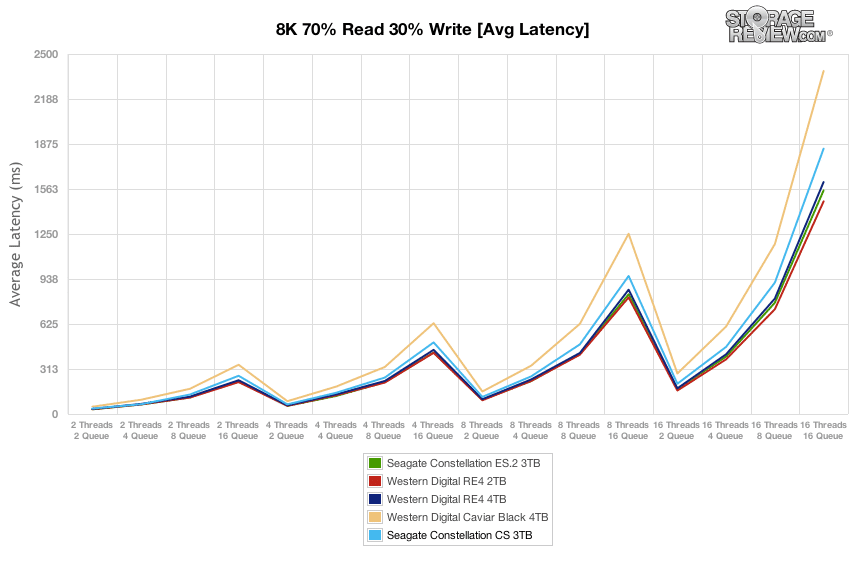
Over the duration of our primary tests at varying thread and queue depth levels, Constellation CS had solid max latency with the second lowest max latency at 410ms for the 2 threads and 2 queue depth level. At the 16 thread and 16 queue depth level, the CS had was in the middle of the pack at 4,812ms.
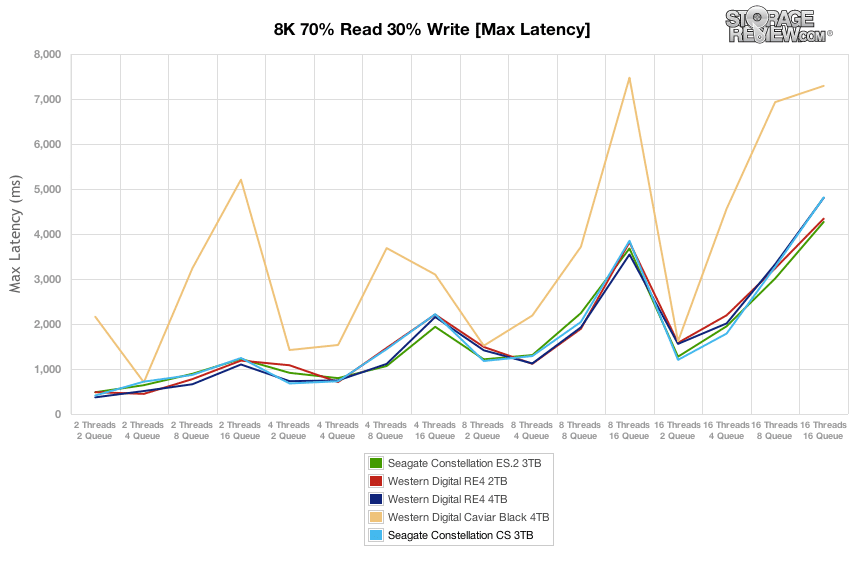
For the entirety of the thread/queue spectrum, the Constellation CS maintained latency just higher than most of the competition, but lower than the WD Black 4TB.
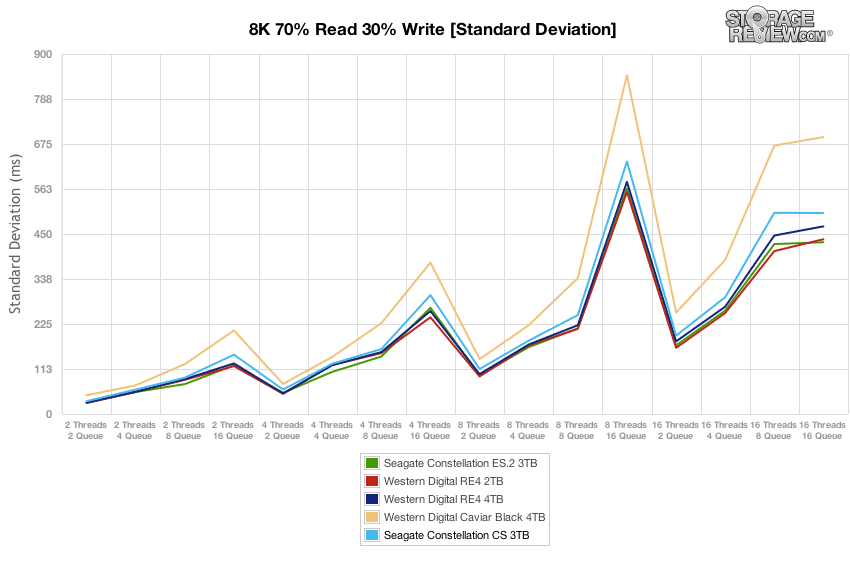
Fairly recently, we have added a 128k test to our Enterprise Synthetic Workload. It is a large block sequential test that shows the highest sequential transfer speed for a platter drive. Looking at the 128k performance of 100% write and 100% read activity, the Constellation CS 3TB measured strongly at 190066 KB/s read and 188698 KB/s write, which were solid marks in both read and write activity.
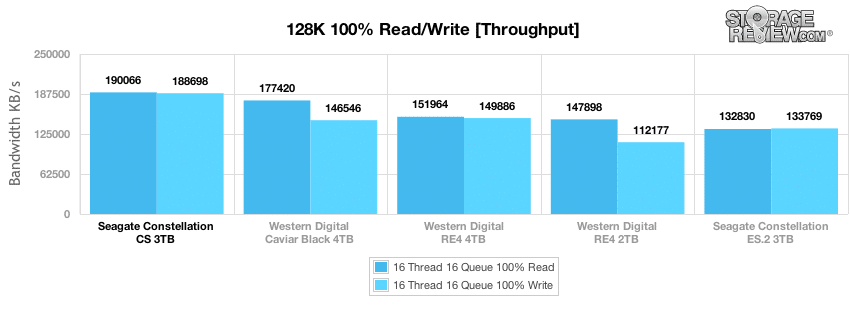
The next workload we used is our File Server profile which puts the drives through a varying workload. We scaled the thread and queue count from 2T/2Q up to 16T/16Q. Under this range of workloads, the Seagate Constellation CS 3TB ranked near the bottom of the pack, just above the WD Black 4TB.
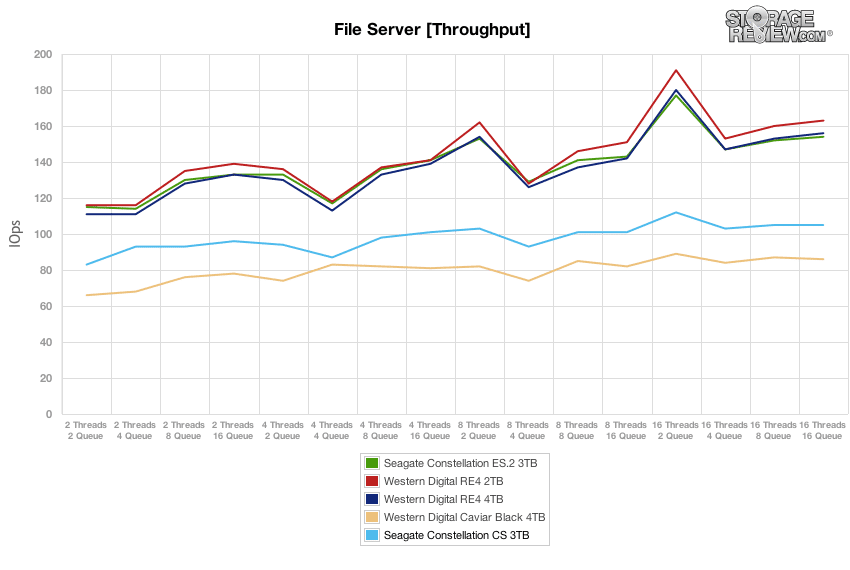
At all queue depths, the Constellation CS was higher than the rest of the drives in the pack except the WD Black 4TB. It peaked much higher than most of the drives at 2,410ms.
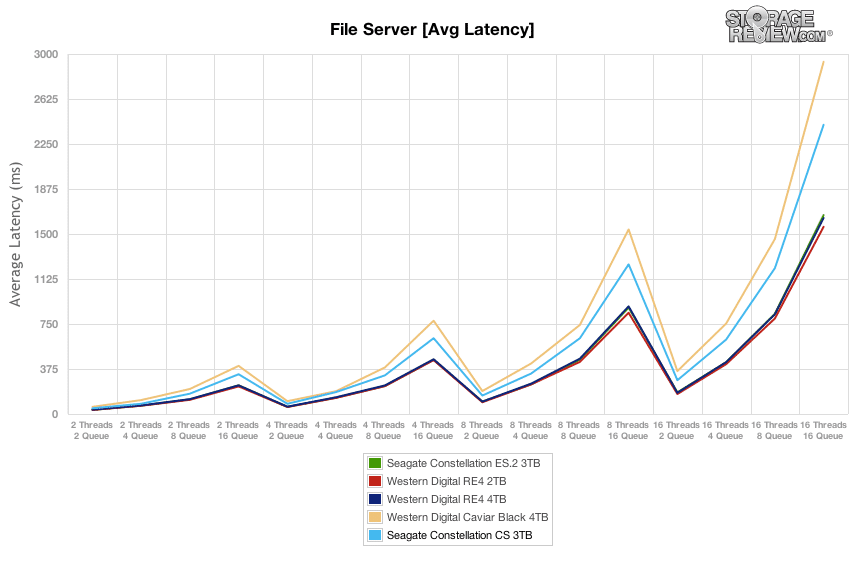
Comparing peak response times in our File Server profile, the Constellation CS was far more consistent than the WD Black 4TB, but behind the other drives in keeping latency down.
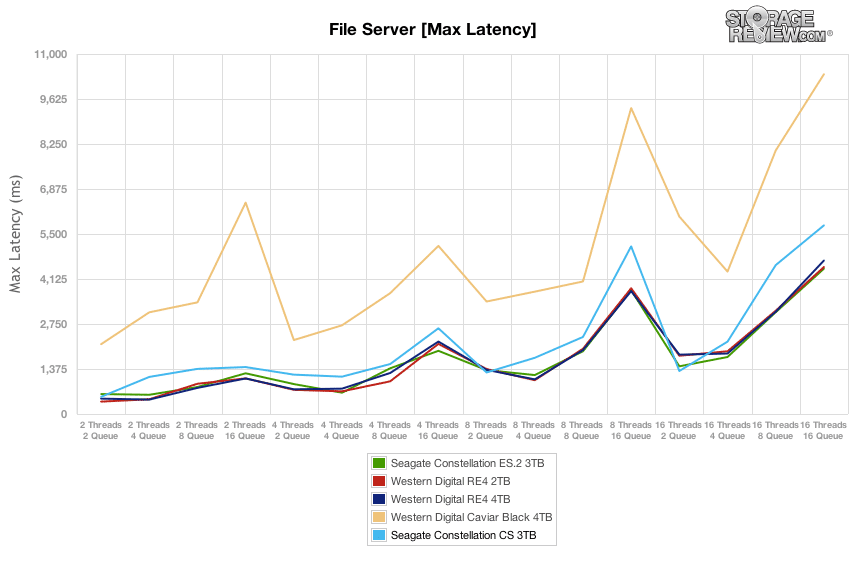
Looking at the latency standard deviation, the Constellation CS came in nearly at the bottom of the pack in latency consistency, beating out the WD Black 4TB again.
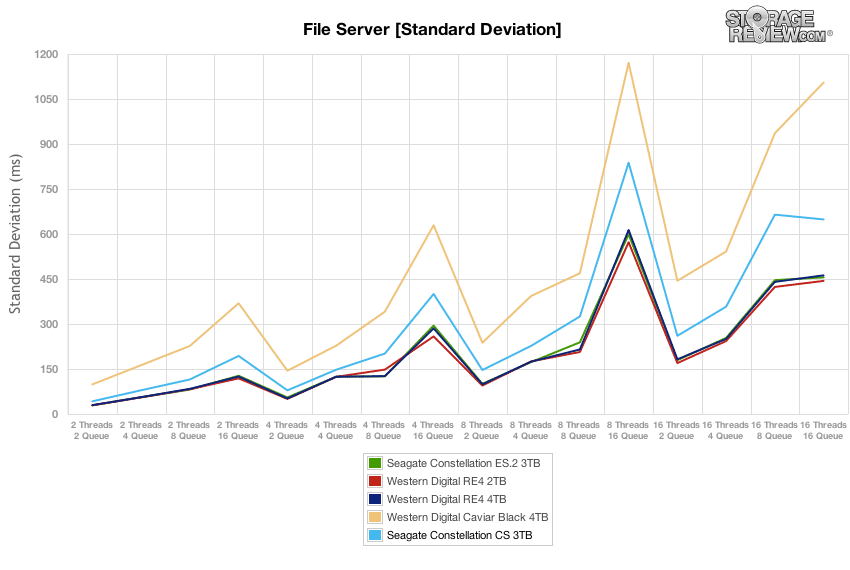
Our final test is the Web Server test, which is traditional 100% read activity. The Seagate Constellation CS performed above the WD Black 4TB again, and it did have a high peak at 8T4Q.
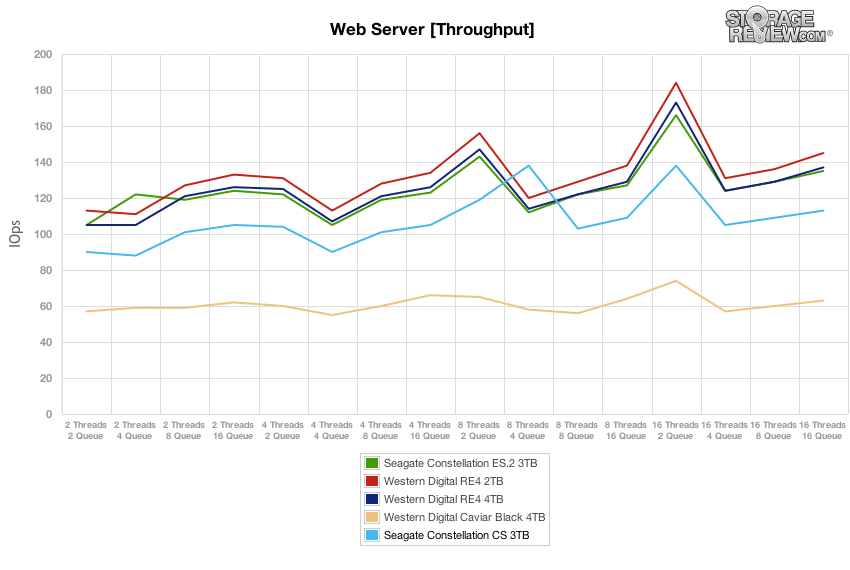
The Constellation CS performed competitively in our next test of average latency in the Web Server profile, though it was edged out by all drives except the WD Black 4TB.
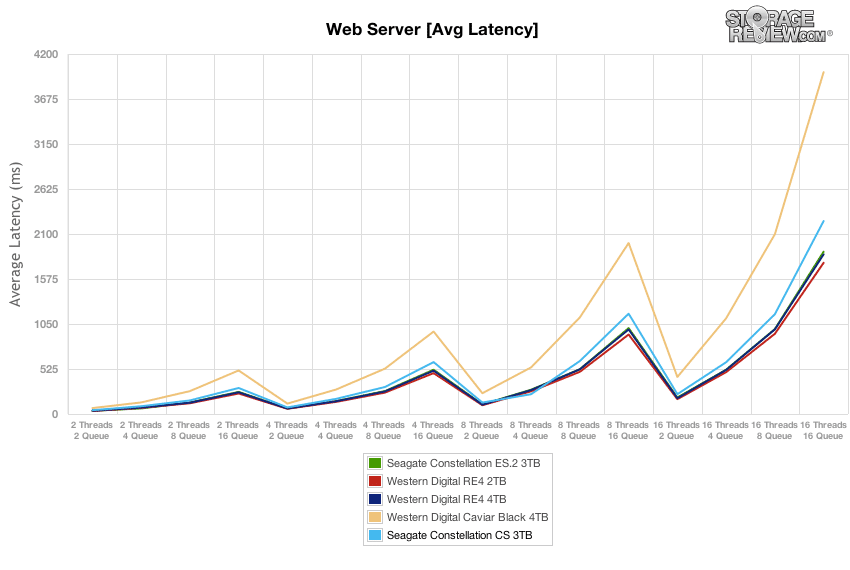
Looking at Max Latency in our Web Server profile, the Constellation CS performed in consistent competition with the rest of the group, not including the less-efficient latency-saturated WD Black 4TB.
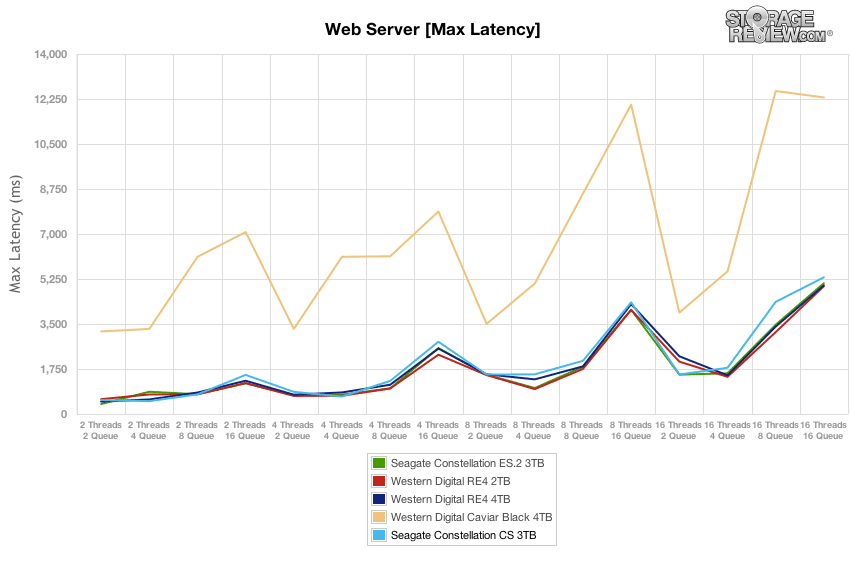
Comparing latency consistency in our read-only Web Server profile, the Seagate Constellation CS 4TB was behind most of the competition by a small margin.
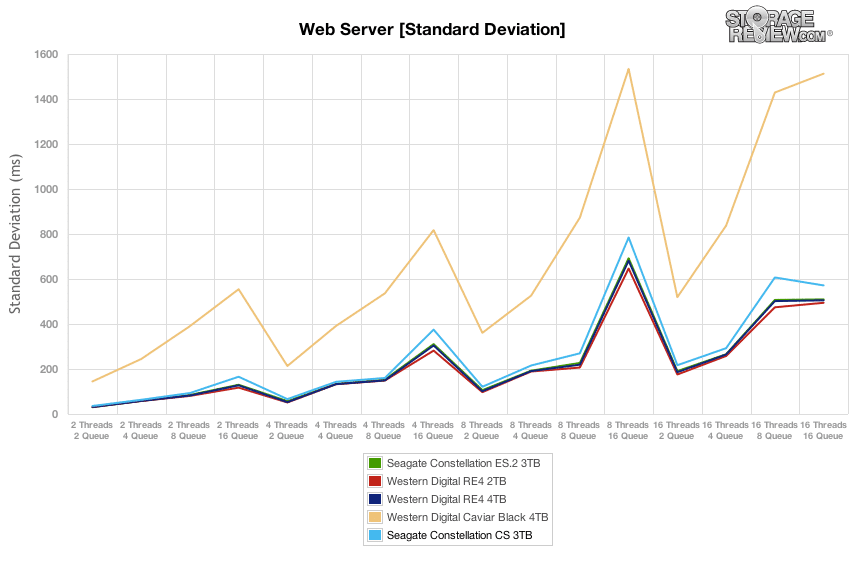
Conclusion
The Seagate Constellation CS is a drive designed specifically for enterprise organizations who are on a tight capital budget for low-priority data but don’t want the risk of using consumer drives for enterprise workloads. Constellation CS drives offer the lowest per-gigabyte cost that organizations will find in the enterprise market, making them worthwhile to consider for deployment. The Constellation CS offers that standards that enterprises look for – it’s a 7,200 RPM, 3.5-inch HDD that offers capacities that range up to 3TB. It goes even further though as it is also offered as an SED with Instant Secure Erase to keep data integrity high while making drives reaching retirement age easy to take out of operation.
When it comes to this space, the real driver in purchasing decisions for most organizations will be cost, which certainly benefits Seagate’s Constellation CS. The drives offer the security the enterprise requires as well as the bulk-storage. Most organizations looking to deploy ultra-low cost drives won’t be considering performance as even a top-3 factor in purchasing. As long as the drive offers decent performance that’s probably good enough; they simply need data available in a timely manner if it is requested. In the case of the Seagate Constellation CS, it doesn’t offer class-leading performance, but its class-leading value is more attractive in the market. Even with those economics in play, it still had good marks in our 8k and 128k testing profiles. While it did lack in IOPS and produced greater latency than several comparables, it beat out the client-focused WD 4TB Black time after time. Couple adequate performance with exceptional value, and the Seagate Constellation CS will meet the cost-effective, solid performance parameters of many organizations.
Pros
- Low cost, enterprise-class drive
- Optional SED
- Power-efficient
Cons
- Tops out at 3TB
Bottom Line
The Seagate Constellation CS offers organizations just what they need – lots of capacity and enterprise features to ensure the integrity of the drive for bulk storage at a solid price point.
Seagate Constellation CS Product Page
Seagate Constellation CS at Amazon.com
